Lanello/is: Difference between revisions
(Created page with "{{CCO}}, bls. 297.") Tags: Mobile edit Mobile web edit |
(Created page with "Category:Himneskar verur Category:Boðberar") |
||
| Line 245: | Line 245: | ||
{{CCO}}, bls. 297. | {{CCO}}, bls. 297. | ||
[[Category:Himneskar verur]] | |||
[[Category: | [[Category:Boðberar]] | ||
[[Category: | |||
<references /> | <references /> | ||
Revision as of 11:19, 3 January 2025
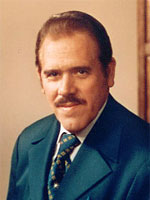
The ascended master Lanello was recently embodied on earth as the twentieth-century mystic and messenger for the ascended masters, Mark L. Prophet. In this and in many previous embodiments, he and his twin flame, the messenger Elizabeth Clare Prophet, have served the Great White Brotherhood and sought to set forth the true teachings of Christ.
Fyrri jarðvistir
Thousands of years ago, when the bodhisattva Sanat Kumara came from Venus to keep the flame of life on earth, Lanello and his twin flame and other light evolutions of the planets of this solar system were among the sons and daughters of God who accompanied him. The history of Lanello’s mission is the story of a soul seized with a passion that is the love of God.
Meistari áköllunarinnar á Atlantis
Á Atlantis var hann prestur hins helga elds og meistari ákallsins í Logos-musterinu.
Stjórnandi í Inka siðmenningunni
Lanelló var valdhafi Inka siðmenningarinnar.
Nói
► Aðalgrein: {{{2}}}
Sem spámaðurinn Nói fékk hann spádóminn um flóðið og áminnti fólkið í meira en í eina öld.
Lot
Hann var Lot, „bróðursonur Abrahams,“ á tuttugustu öld f.Kr. — Guðsmaðurinn í hinum voluðu borgum á sléttunni, Sódómu og Gómorru.

Ikhnaton
► Aðalgrein: {{{2}}}
Thirty-three hundred years ago, as the Egyptian Pharaoh Ikhnaton, he overthrew the tradition of idolatry, challenged the false priesthood, and established a monotheism based on the worship of Aton, God of the Sun. During his reign, Egypt enjoyed a golden age of art, poetry and music.
Esóp
► Aðalgrein: {{{2}}}
As Aesop, he was a Greek slave in the sixth century B.C. who won his freedom as a master of didactic stories and fables, though he was murdered by the townspeople he sought to serve.
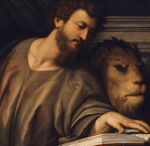
Guðspjallamaðurinn Markús
► Aðalgrein: {{{2}}}
Then as Mark the Evangelist, he wrote the account of the works of Jesus—the Gospel of Deeds—as confided to him by Peter the Apostle. His mother was one of the most devoted of the women disciples, and Mark remembered when, as a boy, Jesus celebrated the Last Supper in the Upper Room. He was raised an Essene and, being well-educated, was chosen Peter’s chief disciple and secretary and was taken to Antioch to assist Paul. He became an exponent of the deeper mysteries of Christianity and founded the Church at Alexandria, where he was later martyred.
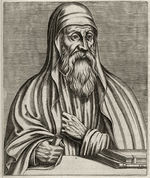
Origenes af Alexandriu
► Aðalgrein: {{{2}}}
As Origen of Alexandria, he returned in the second century to the city he had known as St. Mark and was one of the most distinguished theologians of the early Church, setting forth the true teachings of Jesus Christ on reincarnation and the heavenly hierarchy. At the age of eighteen, he was appointed head of the Catechetical School—the first institution where Christians could be instructed in both the Greek sciences and the doctrines of holy scripture. He lived as an ascetic, working day and night with the crowds, lecturing and giving personal consultation. He made a thorough study of Plato, Pythagoras and the Stoics and learned Hebrew in order to properly interpret scripture. But his deep understanding seemed to shallow, worldly minds bizarre and heretical.
Banished from Egypt, Origen nevertheless became an honored teacher in Palestine at Caesarea where he established a school famous throughout the East. He was imprisoned during the persecution of Decius, tortured and later died. Origen left behind a massive body of writings, numbering close to one thousand titles. His books were widely used for more than a century, but not without harsh criticism. In the fifth century, Rufinus of Aquieleia translated and made significant alterations in Origen’s work, and Jerome condemned his teaching as heresy. In the sixth century, a list of fifteen anathemata were drawn up by Emperor Justinian in the Fifth Ecumenical Council, followed by the physical destruction of his writings, of which few remain today.
Lanselot
In the days of Arthur the King, the soul of Lanello came from France as Launcelot du Lac. According to legend, the infant Launcelot was laid down beside a lake and the Lady of the Lake carried him off to her kingdom of ten thousand maidens where no man was allowed. Here he matured in great honor and purity and thus was known as Launcelot du Lac (Launcelot of the Lake). He became Arthur’s closest friend, their soul-relationship that of guru and chela, and the champion of Queen Guinevere, his twin flame.
The jealousy, intrigue and witchcraft of Modred and Morgana La Fey challenged the deep mutual love of the “trinity” of Camelot, driving wedges of distrust between king and queen, knight champion, and the other knights of the Round Table, ending in the death of Arthur and most of the knights and the seclusion of Guinevere and Launcelot in respective roles as renunciates of the Church.

Bódhidharma
► Aðalgrein: {{{2}}}
As Bodhidharma, he was the founder of the Zen school of Chinese and Japanese Buddhism. Born a Brahman around A.D. 440 in southern India, he converted to Buddhism and traveled to China to spread the teachings of the Buddha. The essence of Bodhidharma’s message is that we cannot realize ultimate truth or attain our own Buddhahood by means of words and letters—we must discover for ourselves our real nature, our Buddha-nature.
Klóvis
As Clovis, he established the French monarchy in the sixth century. He married his twin flame, then the Burgundian princess Clothilde, a Christian, and was baptized after successfully challenging her God to give him victory in battle. He became a devoted representative of the Church, and Clovis and Clothilde became patron saints of France as the founders of the nation and patron and patroness of the poor.
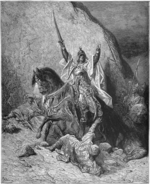
Saladín
Then as Saladin, the great Moslem leader of the twelfth century, he conquered and united all of the Mohammedan world. Although a powerful general, Saladin is remembered for his generosity, gentleness, honesty and justice to both Arabs and Christians alike.
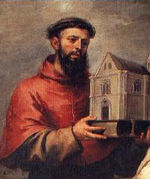
He lived as Saint Bonaventure (1221–1274), a theologian and Franciscan mystic. At the age of four, Bonaventure fell gravely ill. His mother begged Saint Francis to intercede for her son’s life. Through his prayers the child was cured and Francis is said to have cried out in prophetic rapture: “O buona ventura!” (O good fortune!), from which Bonaventure is believed to have received his name. In gratitude for her son’s healing, Bonaventure’s mother consecrated his life to God.
He became a cardinal of the Roman Church and papal adviser, renowned for his abilities as both scholar and preacher. He was declared a doctor of the Church in 1587, and he is called the Seraphic Doctor. Together with Thomas Aquinas, a Dominican, Bonaventure played an important role in defending the mendicant orders in the thirteenth century.

Loðvík XIV
He was Louis XIV, King of France from 1643 to 1715 (the longest recorded reign in European history), who was known as “le Roi Soleil” (the Sun King). He sought to outpicture his soul memory of the culture of Venus in the magnificent palace and gardens of Versailles.
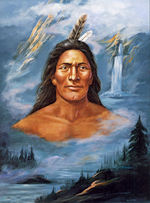
Longfellow
► Aðalgrein: {{{2}}}
As Henry Wadsworth Longfellow (1807–1882), he became the most popular of American poets of the nineteenth century. He was an excellent teacher, first at Bowdoin and later presiding over the modern language program at Harvard for eighteen years. Longing for literary freedom, however, he left his post and began writing the poetry that captured the spirit and heart of America and the abiding flame of his guru, El Morya. It was his own soul of which Longfellow wrote in the narrative poem of the legendary Iroquois chief Hiawatha.
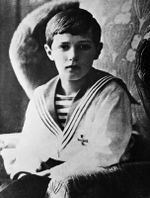
Alexis, sonur keisarans
At the dawn of the twentieth century, Lanello embodied in Russia as Alexis, the son of the tsar and heir to the Romanov throne. However, his father, Nicholas II, abdicated on his behalf, denying the opportunity for his flame to be the light of Russia. The Russian Revolution followed soon thereafter, followed by the execution of the tsar and all of his family.
Had Lanello survived the Bolshevik Revolution, he was destined to unite the children of Mother Russia for a century of enlightened self-rule and the fullest development of the God-potential within and without.
Mark L. Prophet
► Aðalgrein: {{{2}}}
As the twentieth-century master Mark L. Prophet, he was born in Chippewa Falls, Wisconsin, in 1918, the only child of Thomas and Mabel Prophet. His father passed on when he was nine, and he and his mother endured the hardships of the depression years. When a boy of about eighteen, while working on the Soo Line Railroad, he was contacted by the ascended master El Morya, calling him to his mission.
During World War II, he served in the U.S. Air Force and his training under the master continued. In 1958, El Morya directed him to found The Summit Lighthouse in the nation’s capital. Mark himself typed the first dictations given by the ascended masters, called “Ashram Notes.” He was joined by his twin flame, Elizabeth, in 1961, and together they fulfilled the prophecy of Jesus set forth by John the Revelator of holding the office of the “Two Witnesses” and the “Other Two” in this age.[1]
Uppstiginn meistari
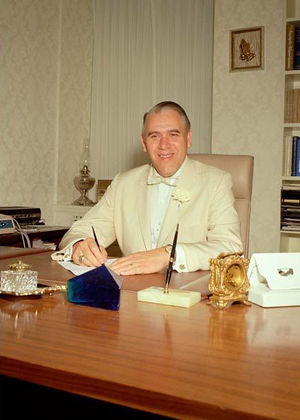
On February 26, 1973, Mark passed on and his soul ascended to the plane of the I AM Presence to carry on his work with the ascended masters and to make contact with their unascended chelas. As the ascended master Lanello, he continues to direct the activities of The Summit Lighthouse, the “Ever-Present Guru” who has said: “Ours must be a message of infinite love and we must demonstrate that love to the world.”
Hinn fyrsta opinbera fyrirlestur sinn gaf Lanelló 20. apríl 1973, aðeins tveimur mánuðum eftir uppstigningu sína:
As I have thought this night upon the many subjects on which I would choose to discourse, I have drawn the conclusion that it is always the most expedient to speak of practical things, even when the heart would sing to the poetic cadences of the music of the spheres, for I am concerned that you wear my mantle—those of you that I have known for so long, for so many embodiments. And therefore, I have enlisted the service of my angels over these past weeks, thinking of what I could do to bring you my joy; and I have asked the angels to sew you a replica of my cape—my blue cape that I have worn even in the physical octave. And I have asked my angels to place that cape upon your shoulders this night, and it might very well come to pass that you shall feel even the fabric of that cape as it rustles around your ankles and around your arms.
Yes, I have fashioned a blue cape for each one of you; that is, my angels—they have taken the fashioning that I have given to them and styled a most noble garment complete with hood like the monks of old. And so before this service is concluded, these angels are going to place my cape upon you that you might also go forth wearing the momentum of my victory in many past embodiments, which I have taken forth from my causal body as a momentum of light to give unto you....
I say, you are all candidates for the ascension if you choose to be. And if you choose to be this night and in the coming weeks, then I will sponsor you and I will direct the Mother of the Flame to sponsor you also. There is no need to tarry; there is no need to go back to the old ways of the human consciousness. I say, your Christed awareness, your Christed Being, is the blazing Reality of your consciousness! It is the new day dawning within you! It is your potential of victory! It is your purity now!
And I say, you do not have to wait for the carnal mind to evolve, for the carnal mind will never evolve, precious hearts; it will never become the Christ. It must be put off and cast into the flame! You have to trade in the old model and take out the new. How long will you dwell with that old model? Some of you are more tolerant of your former selves than you are of your cars that you trade in every year, but you forget to trade in the carnal mind for the Christ mind that is in the height of fashion in the courts of heaven!
And so, precious hearts, I say that of all of the warnings and all of the prophecies that I might prophesy this night, it is this one key of Christhood, and salvation through Christhood, that can give you the ultimate victory. And it is with ultimate victories that we are concerned—not with the skirmishes that are lost or won each hour and each day; nevertheless, these do count as the great Keeper of the Scrolls makes his mark in the Book of Life. But I say, sometimes when you lose in the fray, it is a lesson that needs to be learned; and a temporary loss may mean the ultimate victory, for the lesson that is gained is a measure toward perfection.
And so I say, count the experiences that you have been through as the past that is prologue; and now write the chapter, chapter one on the book of “My Christhood.” Keep a diary that is called “My Christhood,” and write down each day how the flower of the Christ is appearing in your life. And when you know you have done an act in the consciousness of the Christ, write it down and leave the record for yourself, so that in those hours of darkness and moments of trial when you forget and cannot remember one good thing you have ever done because the devils are tormenting you with their lies, then read in the book of “My Christhood” of how you have vanquished error and how you have overcome.
I say, the saga of your lives—of many of you—is beautiful to behold; for you have indeed won in small ways and in great ways. And until the last tally is taken, you never know how the Lord looks upon the balance of power within you. So keep on striving for the light, striving for the right; and know that I, Lanello, walk with you each step of the way.
I am as near as the breath that you breathe. And there is nowhere that you can go that I am not, for I have projected an Electronic Presence of myself to each one of you who will receive me. As Jesus wrote, “He that receiveth a prophet in the name of a prophet shall receive a prophet’s reward.”[2] My reward is the ascension! My reward is light! And if you receive me as a prophet of your ascension, then you can have my Electronic Presence walking next to you, and I will wear my own blue cape. And they will say, “Look at those twins walking down the street.” For you will look like me and I will look like you, and who will say who is ascended and who is unascended? For did they not have a little moment of trouble in discerning the difference between Jesus and his disciples?[3]
So they will not know who is who. And I dare say that when the forces move their chessmen on the board of life to attack your lifestream, they may very well fling those arrows of outrageous fortune at me! And then they will have the reward of attacking an ascended master! And how do you like that? And so we two shall walk hand in hand; and at any hour of the day or night when you reach out your hand for mine, I will clasp your own....
I say to you, whatever you have done in the past, forsake the past! Leave it behind! And let the light of mercy triumph within you, for our God is a God of mercy and his mercy endureth for ever.[4] Therefore, take a step forward this night; and consider that in taking that step you are stepping out of the skins of the former man and into the raiment of the Christ. And when you take that step as I shall direct at the close of my address, you shall have placed upon you my cape, my capuchon.
Athvarf
► Aðalgrein: {{{2}}}
Athvarf Lanellós er í Bingen, við Rínarfljót í Þýskalandi.
He serves on the first ray, and his keynote is “Greensleeves.” He has worked with K-17 for many hundreds of years and continues to work with him from the ascended octave. He is called the Ever-Present Guru because he is always appearing and talking to his chelas.
Heimildir
Mark L. Prophet and Elizabeth Clare Prophet, The Masters and Their Retreats, sjá “Lanelló”.
Mark L. Prophet, as recorded by Elizabeth Clare Prophet, Cosmic Consciousness: One Man’s Search for God, bls. 297.
